 Petzlover
Petzlover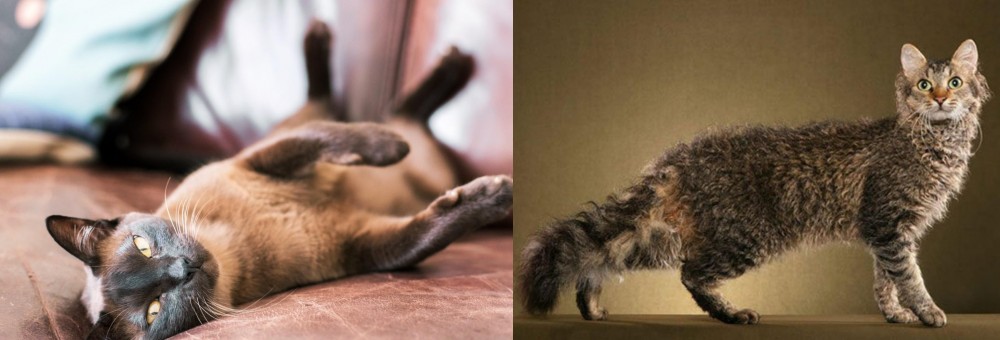 Both Burmese and LaPerm are originated from United States. Both Burmese and LaPerm are having almost same weight. Both Burmese and LaPerm has almost same life span. Both Burmese and LaPerm has same litter size. Both Burmese and LaPerm requires Low Maintenance.
Both Burmese and LaPerm are originated from United States. Both Burmese and LaPerm are having almost same weight. Both Burmese and LaPerm has almost same life span. Both Burmese and LaPerm has same litter size. Both Burmese and LaPerm requires Low Maintenance.
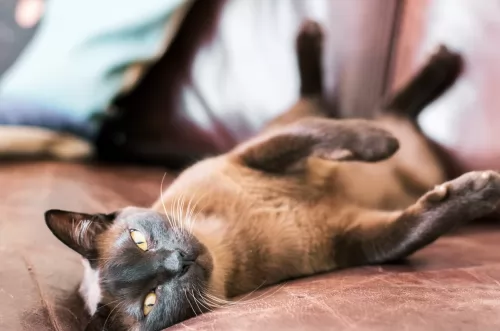 A dark brown cat together with Dr Joseph C. Thompson made their way from Burma to the United States in 1930. Cat fanciers believed that it was a dark-colored Siamese.
A dark brown cat together with Dr Joseph C. Thompson made their way from Burma to the United States in 1930. Cat fanciers believed that it was a dark-colored Siamese.
Dr. Thompson along with other breeders decided to breed the cat and she was the start of the Burmese breed.
Hybrids however, began appearing in the show hall in 1947. This was considered a violation of the show rules of the Cat Fanciers' Association and recognition of the Burmese was withdrawn until 1953. The Burmese Cat Society of America then had to give assurance to the registries that this type of thing would not happen again.
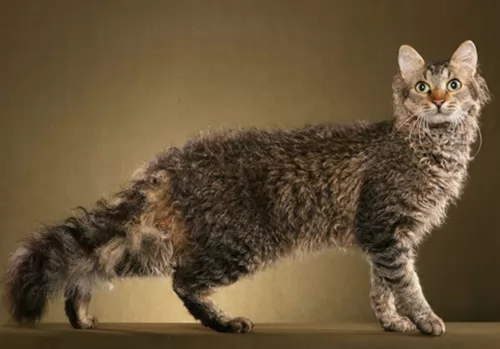 The LaPerm cat hails from the United States of America but you’ll find him in many other countries around the world.
The LaPerm cat hails from the United States of America but you’ll find him in many other countries around the world.
The cat has a dominant gene which results in the unusual curly coat of the cat. This means he is part of the rex breed. This is a term given for the naturally occurring genetic mutation that gives the cat its wavy coat.
It’s not an old cat breed this and it seems to have come about in the early 1980s for the purposes of controlling rodents. The breed founders were Linda and Richard Koehl from Oregon. They started a formal breeding program and the breed was named after their curly coat.
After the cats got the name LaPerm, it was in 2002 that they got recognition from the Cat Fanciers Association.
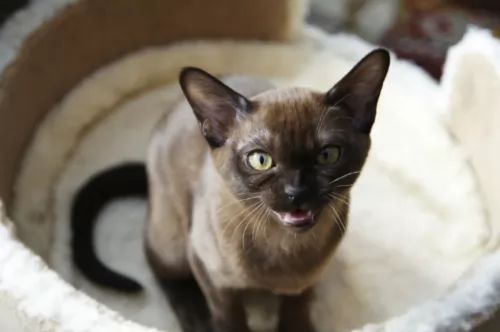 The Burmese is a medium-sized cat - fairly stocky and solid and weighs between 3 and 5kg.
The Burmese is a medium-sized cat - fairly stocky and solid and weighs between 3 and 5kg.
The dense, short coat of the Burmese comes in a variety of colors such as chocolate, cream, sable, red, tortoishell and solid colors too. The color you are most likely to see is sable.
It’s a low shedding cat so his grooming needs are low. The eyes, often a beautiful yellow shade, can be in different shades of yellow really.
Your gorgeous Burmese cat is a curious cat and finds exploring new places a huge adventure. They’re prepared to get on with some other pets in the home, but they may not be happy to welcome all cat breeds. The Burmese don't particularly like sharing their home and his human family with other cats in the home and love to get all the attention for themselves.
Once these cats mature, they do tend to settle down quite a bit and become placid, being a spectator to fun activities rather than a participant.
Still, they love their humans and are more than happy to find a place in the sun and to watch everyone from there.
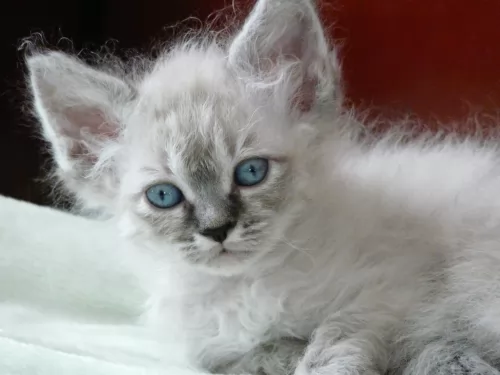 The LaPerm is a medium-sized cat that can weigh anything between 3 and 7kg. They’ve got an athletic build. The legs and the neck are fairly long.
The LaPerm is a medium-sized cat that can weigh anything between 3 and 7kg. They’ve got an athletic build. The legs and the neck are fairly long.
It is thought that they are more hypoallergenic than many other cats but no cat is truly hypoallergenic. The coat is the cat's most exceptional feature, with loose curls. The coat can be long or short. All colors and patterns are acceptable, with red, tabby, and tortoiseshell being more common.
There is no undercoat. The eyes of the cat are medium-sized and almond-shaped.
These are affectionate cats with an outgoing personality. He has a sense of humor so becomes an entertaining cat.
He gets on well with children in the home. People who have owned the cat describe him as clownish. He is playful and that means providing him with some interesting toys.
It’s an intelligent cat and learns to use his paws to open doors and tap you to take notice. He is also fairly active and will willingly retrieve small balls. He is gentle, loving, quiet, and affectionate towards his human family.
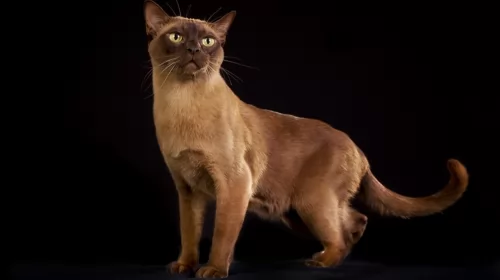 The Burmese cat loves to climb and survey his world from a high perch so don’t forget to invest in some kind of climbing apparatus or cat tree for him.
The Burmese cat loves to climb and survey his world from a high perch so don’t forget to invest in some kind of climbing apparatus or cat tree for him.
He tends to become a bit inactive as he gets older and this can be a problem and lead to obesity. Encourage your Burmese cat to come out and play to make sure he gets enough exercise.
He loves being noticed by his human family and will thrive on being petted and noticed, and of course, you’ll want to, as a Burmese has got a whole love of loving to give you too.
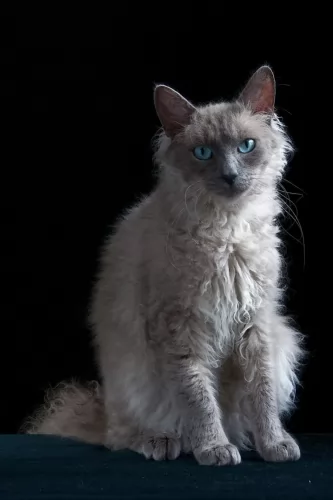 The LaPerm cat is known for its loyal, loving personality. It’s a cat that thrives on being involved with its human family and can easily turn into a lap-cat.
The LaPerm cat is known for its loyal, loving personality. It’s a cat that thrives on being involved with its human family and can easily turn into a lap-cat.
They’re active and also intelligent, and will love you to play some games with him. He will become quite vocal when he demands your attention.
Provide him with a climbing tree as he is active and loves to climb where he can survey the room and decide which human being’s lap he has in mind.
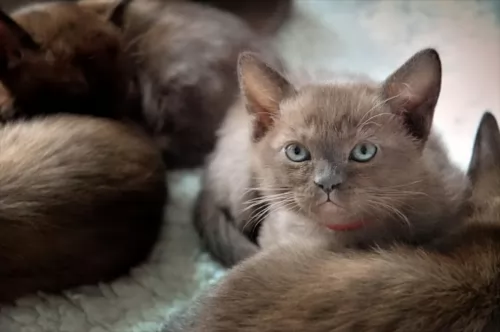 These cats are a healthy breed and if you take good care of your Burmese he can live to up to 13, 14 or 15 years of age.
These cats are a healthy breed and if you take good care of your Burmese he can live to up to 13, 14 or 15 years of age.
But you have to be aware of diabetes mellitus as well as something known as hypokalaemic polymyopathy – muscle weakness because of low blood potassium levels.
You’ve also got to look out for obesity as these are sturdy, stocky cats and overeating can lead to obesity and a host of health issues such as painful joints and diabetes.
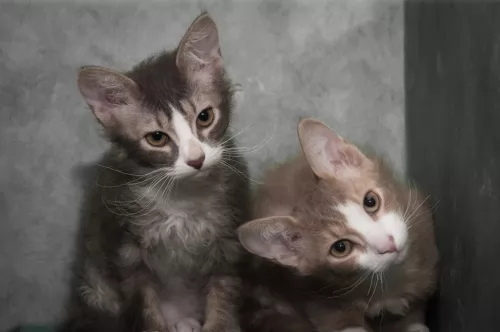 La Perms are generally healthy cats. However, any cat owner needs to recognize the signs of some of the common cat illnesses there are.
La Perms are generally healthy cats. However, any cat owner needs to recognize the signs of some of the common cat illnesses there are.
Cancer, feline immunodeficiency virus, diabetes, and heartworm are all diseases that your healthy cat can at some time succumb too.
Keep an eye on your furry friend, and if he is lethargic and no longer his happy self, get him to the vet immediately for a check-up.
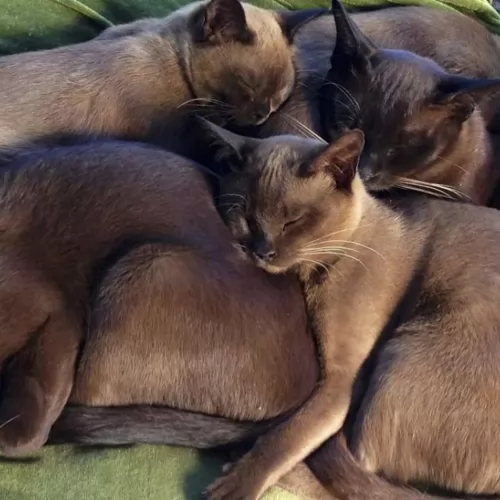 Burmese cats are naturally good climbers and you will need to provide these cats with some kind of climbing tree or something else where they can climb and perch.
Burmese cats are naturally good climbers and you will need to provide these cats with some kind of climbing tree or something else where they can climb and perch.
While adult Burmese cats tend to be fairly placid cats, they still love to play and love the interaction between themselves and their humans. As he gets older, don’t forget to keep up a regular playtime with him.
Shedding is minimal with the Burmese cat and weekly brushing will be a good bonding session and also keep your Burmese cat’s coat healthy and shiny by removing dust and loose hair.
Your fur child requires the best – a balanced cat food packed with protein to support him in all his activities and to ensure he maintains a good weight.
There are many excellent commercially manufactured cat foods on the market so learn to understand the ingredients and what nutrients are required.
Certainly, your Burmese kitten will require a complete and balanced kitten food with all the right nutrients to ensure good bone and coat growth. Then it is time to choose a kitten food which will later change to adult food as your kitten matures.
There are excellent cat foods for every stage and season of your cat’s life and from top brands – people who know the needs of cats.
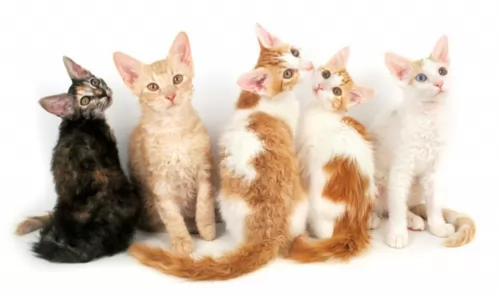 The LaPerm’s unusual coat is easy to care for as it isn’t a big shedder. You’d think that the curls would tangle but they don’t. You can gently comb or brush the curls once or twice a week. Just like with a human perm, you can mist the cat’s curls and comb and fluff them out with your fingers.
The LaPerm’s unusual coat is easy to care for as it isn’t a big shedder. You’d think that the curls would tangle but they don’t. You can gently comb or brush the curls once or twice a week. Just like with a human perm, you can mist the cat’s curls and comb and fluff them out with your fingers.
Cats are particularly prone to periodontal disease, so look into your cat’s mouth occasionally to see that the teeth are as they should be. Brushing the teeth can stress a cat out and make it miserable and the dry cat foods help to keep the teeth clean.
Pet groomers and the vet can check out the teeth for you and make sure they are in tip-top condition.
Make sure your cat’s eyes are clear and bright and free of discharge. Trim the nails as required – something the vet or the pet groomers can also do for you.
Provide your LaPerm with a litterbox and keep it spotlessly clean, ridding it regularly of the cat’s droppings.
Even though there are excellent commercial cat foods on the market, some cats develop finicky eating habits. Don’t start feeding your cat human foods and snacks to coax him to eat. It can cause a host of digestive problems.
Cats are carnivores and require foods high in protein to remain healthy. A veterinarian will need to examine your cat if he is refusing to eat and is losing weight.